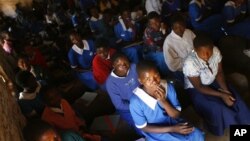BLANTYRE —
The Forum for African Women Educationists in Malawi (FAWEMA), with funding from a Canadian organization, is working on a pilot project to provide affordable sanitary pads to school girls to reduce absenteeism.
A recent study by FAWEMA shows that many female students in rural areas stay away from schools for at least five days during their menstrual periods, a development that affects their performance in class.
Cecilia Njoka is the project officer at FAWEMA.
“The challenges that these girls, mostly in rural areas, are facing is that when they are menstruating, they would not go to school. And [another problem is about] the sanitary menstrual hygiene, because if they go to school they fear messing up their uniform [since] they have nowhere to change their clothes and make themselves clean and comfortable so that they go back and attend classes.”
Njoka says to reverse the trend, the organization has engaged women volunteers known as mother groups who are producing reusable sanitary pads from local materials, which help improve hygiene among adolescent girls in both primary and secondary schools.
“To help them remain in class, what we are doing is to ensure that the girls have sanitary pads that they are able to use in school, and at the same time change into another one, and also have a washroom where they can get into the room, clean themselves and attend the class.”
NGO assistance
The World University Service of Canada (WUSC) provided funds to pilot the project which started in October 2012.
Lesley Kitting is a Canadian volunteer with the project. She told Malawi’s state television station that the pads are approved by hygiene experts.
“The pads are made of towering flex form and washable fabric, so as long as the girls wash the pads properly and not share the pads, they are determined to be quite safe. We have consulted with the Canadian doctors and Malawian gynecologist as well as an American nurse. If anything, it requires washing.”
Girls themselves, agree. Joyce Mkandawire is the communications adviser for Girls Empowerment Network, a Blantyre-based NGO which works to advance the rights, status and well-being of adolescent girls in the country.
“The pads have proven to be effective, because pads which we use are not affordable and we use it once and then you throw it way. And it’s also expensive. But these reusable sanitary pads you can use it and wash it and use it as long as you may want to. It is something that you can use it at home and dry it, so you can use it for over a time rather than the pads we use today, you use it today and then you junk it.”
Similar projects are reported to have helped keep girls in school in many African countries, including Kenya, Uganda, Tanzania and Zimbabwe.
In Malawi, the project is being piloted at Mwasibu Community Day Secondary School in the capital, Lilongwe. Funds permitting, Njoka says, it is expected to spread to other schools.
A recent study by FAWEMA shows that many female students in rural areas stay away from schools for at least five days during their menstrual periods, a development that affects their performance in class.
Cecilia Njoka is the project officer at FAWEMA.
“The challenges that these girls, mostly in rural areas, are facing is that when they are menstruating, they would not go to school. And [another problem is about] the sanitary menstrual hygiene, because if they go to school they fear messing up their uniform [since] they have nowhere to change their clothes and make themselves clean and comfortable so that they go back and attend classes.”
Njoka says to reverse the trend, the organization has engaged women volunteers known as mother groups who are producing reusable sanitary pads from local materials, which help improve hygiene among adolescent girls in both primary and secondary schools.
“To help them remain in class, what we are doing is to ensure that the girls have sanitary pads that they are able to use in school, and at the same time change into another one, and also have a washroom where they can get into the room, clean themselves and attend the class.”
NGO assistance
The World University Service of Canada (WUSC) provided funds to pilot the project which started in October 2012.
Lesley Kitting is a Canadian volunteer with the project. She told Malawi’s state television station that the pads are approved by hygiene experts.
“The pads are made of towering flex form and washable fabric, so as long as the girls wash the pads properly and not share the pads, they are determined to be quite safe. We have consulted with the Canadian doctors and Malawian gynecologist as well as an American nurse. If anything, it requires washing.”
Girls themselves, agree. Joyce Mkandawire is the communications adviser for Girls Empowerment Network, a Blantyre-based NGO which works to advance the rights, status and well-being of adolescent girls in the country.
“The pads have proven to be effective, because pads which we use are not affordable and we use it once and then you throw it way. And it’s also expensive. But these reusable sanitary pads you can use it and wash it and use it as long as you may want to. It is something that you can use it at home and dry it, so you can use it for over a time rather than the pads we use today, you use it today and then you junk it.”
Similar projects are reported to have helped keep girls in school in many African countries, including Kenya, Uganda, Tanzania and Zimbabwe.
In Malawi, the project is being piloted at Mwasibu Community Day Secondary School in the capital, Lilongwe. Funds permitting, Njoka says, it is expected to spread to other schools.








